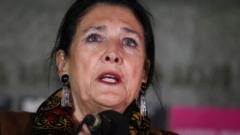Zourabichvili's background is deeply intertwined with Georgia's history. Born to émigrés in France, she spent years advocating for Georgia's independence from Russian influence. Initially supported by Georgian Dream, the party's shift towards authoritarianism has led her to align with pro-EU protests against their policies, particularly in the wake of Russia's invasion of Ukraine. She has condemned the government's refusal to impose Western sanctions and has become a symbol for those opposing the perceived Russian alignment of the current administration.
As tensions mount, there are fears of a violent crackdown on the protests, and the government has threatened legal consequences if Zourabichvili does not relinquish power. The political landscape is volatile, with some viewing her as a figure who may unite fractured pro-European forces in Georgia or, alternatively, a potential martyr if her removal turns violent. The unfolding scenario presents critical implications for Georgia's trajectory and its aspirations for integration with Europe.
Zourabichvili remains fortified by what she believes is the support of the Georgian populace, claiming that the choice lies between independence and subjugation, Europe and Russia.
Her commitment to resisting the government’s authority while standing with protestors who share her views highlights the complex dynamics at play in Georgia's pursuit of a truly democratic and sovereign future.
As tensions mount, there are fears of a violent crackdown on the protests, and the government has threatened legal consequences if Zourabichvili does not relinquish power. The political landscape is volatile, with some viewing her as a figure who may unite fractured pro-European forces in Georgia or, alternatively, a potential martyr if her removal turns violent. The unfolding scenario presents critical implications for Georgia's trajectory and its aspirations for integration with Europe.
Zourabichvili remains fortified by what she believes is the support of the Georgian populace, claiming that the choice lies between independence and subjugation, Europe and Russia.
Her commitment to resisting the government’s authority while standing with protestors who share her views highlights the complex dynamics at play in Georgia's pursuit of a truly democratic and sovereign future.


















